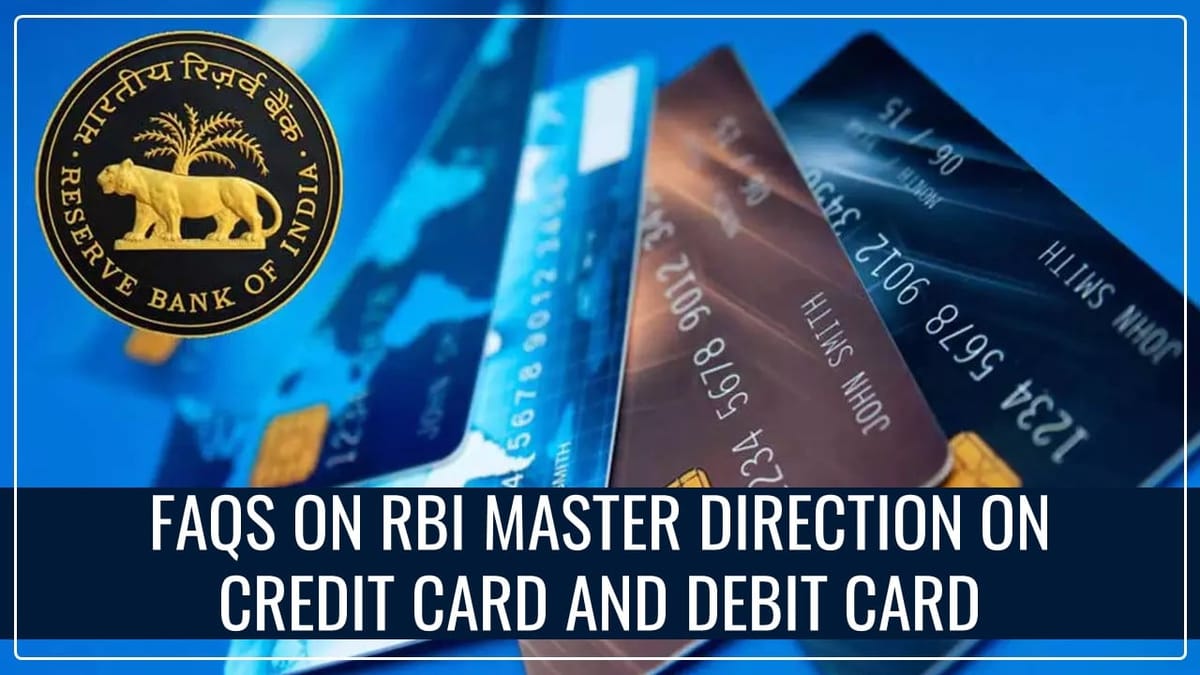Reetu | Mar 8, 2024 |

FAQs on RBI Master Direction (MD) on Credit Card and Debit Card
The Reserve Bank of India (RBI) has notified amendment in Master Direction on Credit Card and Debit Card. And regarding this amendment, RBI released FAQs on RBI Master Direction (MD) on Credit Cards and Debit Cards.
The Frequently Asked Questions are as follows:
Response: Card issuers are prohibited from issuing unsolicited credit cards and are required to seek prior and explicit consent from the customer before issuing a card. However, if the customer receives an unsolicited card, he/she should refrain from activating or providing consent for the activation of the card through OTP or any other means. If no consent is received for activating the card, the card issuer is required to close the credit card account without any cost to the customer within seven working days from the date of seeking confirmation from the customer and shall also intimate the customer that the credit card account has been closed. Subsequent to receiving the intimation from the card issuer that the card account has been closed, the customer shall destroy the card. Further, the customer may file a complaint with the card issuer against the issuance of an unsolicited card and escalate it to the RBI Ombudsman as per the Integrated Ombudsman Scheme (please refer to the response to query 17 below).
Response: Yes, paragraphs 7(b) and 7(c) of the MD have enabled the issuance of various types of credit cards which can be customized to access the limits available in different loan accounts, duly aligned to the terms and conditions stipulated for the concerned loan account. For example, a customer availing an overdraft facility from a bank can be issued a type of credit card to access the funds available under the facility. The terms of usage of this credit card (interest charged, repayment schedule, penalty, cash withdrawal limit etc.,) shall correspond to the terms and conditions applicable to the overdraft facility.
Further, para 7(c) provides adequate flexibility to the card-issuers to design Business Credit Cards as envisaged in their Credit Card policy. However, it may be noted that banks cannot issue debit cards to cash credit/loan accounts.
Response: Customer-initiated process indicating intent to use a credit card such as PIN generation, modification of transaction control, Interactive Voice Response, recorded call to the customer care centre and SMS may be considered as activation. However, if the card is not activated by the cardholder for more than 30 days from the date of issuance, card-issuers shall seek One Time Password (OTP) based consent in line with para 6(a)(vi) of the MD.
Response: In addition to financial transactions, any process initiated by the cardholder such as generation of statement, change of PIN, change in transaction controls, etc., shall be considered for treating a card as ‘used’. However, any calls made to the customer care centre, for reasons other than those cited above, shall not be considered towards usage of a card.
Response: For business credit cards, wherein the cards have been issued based on the application by a corporate or business entity, card-issuers shall seek explicit consent as required under paragraph 6(a)(vi)/send intimation as required under paragraph 8(b) respectively from/to the principal account holder (viz. corporate or business entity) unless specified otherwise in the agreement. Similarly, with regard to retail credit cards too, it is clarified that the requisite consent shall be sought from the principal cardholder and not from the add-on cardholders.
However, for blocking of such credit cards, either the actual cardholder or the principal cardholder can initiate the request.
Response: In case a cardholder does not clear the total amount due within the payment due date, the interest-free credit period will be lost, and interest may be levied from the date of transaction on the outstanding amount (adjusted for payments/refunds/reversed transactions as and when credited) and not on the total amount due. Further, late payment fees and other charges relating to delay in payment shall be levied only on the outstanding amount (adjusted for payments/refunds/reversed transactions as and when credited) after the payment due date and not on the total amount due.
Response: No, card-issuers shall not capitalize i.e., levy interest or any other charges, on the unpaid taxes/levies/charges. As the provision contained under para 9(b)(ii) of the MD became effective from October 01, 2022, card-issuers shall not capitalize unpaid taxes/levies/charges that have been billed from October 01, 2022.
To Read More Download PDF Given Below:
In case of any Doubt regarding Membership you can mail us at contact@studycafe.in
Join Studycafe's WhatsApp Group or Telegram Channel for Latest Updates on Government Job, Sarkari Naukri, Private Jobs, Income Tax, GST, Companies Act, Judgements and CA, CS, ICWA, and MUCH MORE!"